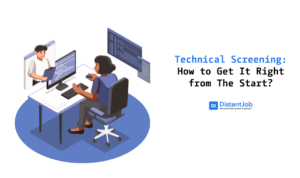Companies around the world invest a lot of time and money in recruiting the best IT talent. Recruitment agencies can charge anything up to 30% of the starting salary for finding the right person, and then you have to consider the costs of onboarding and filling any skills gaps with training. And that’s if everything goes well. If you hire the wrong person, to begin with, and have to let them go and find someone else, you’re looking to double the initial amount.
And it isn’t just the cost of any severance package and having to rehire the (hopefully) right person, there’s also the damage done to morale within your team, and the potential impact on deliverables that choosing the wrong person can bring. We spend our days matching the right candidate to the right opportunity, and here’s what we’ve learned along the way.
‘Fit’ is the Most Important Thing
The single most important thing you can consider when making a hire, especially if you’re taking on a new remote developer, is that they are the right cultural fit for your team and business. If you don’t have a clear idea of what your company/team culture is, then spend some time thinking about that before you recruit. What are the values that you share? What’s the work ethic? What are the common characteristics of people in the team?
Once you’ve got a good idea of that, you can start looking for other people ‘like’ you. If you don’t have those shared ideals, it can lead to friction and resentment within your team. The best approach to finding out what a candidate’s values are is to ask scenario-based questions, the sort that explores how someone would approach a problem, or feel if they were asked to join a marathon relay to raise funds for charity.
Verify All Information
It’s common advice for candidates to ‘tweak’ their resume so that it better aligns with each role they apply for – and that’s fine if all they do is highlight the things that make them perfect for you. The issue with this is when ‘tweaking’ becomes ‘padding’ or outright exaggeration. So how can you tell if your candidate is as good as they look on paper?
One way is by testing them (more on that later) but the simplest is just to do your due diligence and follow up on what they claim to be true. Take up references, ask to see copies of certifications; if you can, ask to speak to someone who has worked with them before to get more information on what they’re like as part of a team.

Use the Right Tests to Recruit the Best IT Talent
The classic way to verify a developer’s skills is to use the whiteboard test. They’re asked to solve coding problems without any access to manuals or resources. Thankfully, the shortcomings of this test are being acknowledged; we know that some of the best coders need to check syntax or ask others for help to get things done and that’s not a bad thing.
A better way to validate talent is to either use a test that assesses the ability to think like a programmer rather than a particular language, or to have one of your existing team come up with a genuine bug fix or change that’s needed that can be done in a relatively short space of time. You’ll learn more about how the candidate approaches the problem from the solution itself.
Check Your Recruiter
If your recruiter is going to be doing any kind of pre-screening for you, check that they understand what they’re looking for. The key to hiring real tech talent in your company is to have recruiters who understand the field and, therefore, can ask the right questions. If they’re not industry specialists, and recruiters from larger companies sometimes aren’t, then they may now know how to vet candidates to make sure you get a promising shortlist.
Smaller recruiters can work in different ways and have their own unique specialisms. Some focus on C-level, while others only recruit tech talent. To toot our own horn a little, we’re a boutique agency that specializes in hiring remote technical staff, particularly developers. We really understand what makes for a great developer, because we spend all day talking to them.
The larger recruiters are big business; they handle a large turnover of vacancies for an equally large number of clients. Candidates tend to come to them, rather than the other way around. For some of these recruiters, a generic questionnaire, or a logarithm that picks out keywords from resumes is how they create their shortlist. It’s impersonal.
Smaller firms tend to operate on a more personal level; they’ll know you, they’ll know the candidates – the more direct the relationship, the more bespoke the service is. More than that, they’ll understand their specialism far better than a large recruiter can.
Recruitment Can be Quick, Go Remote
Finding the right person can take some time, and that’s not always convenient. If one of your best developers hands in her notice, you may have just a few weeks to get someone else in the role, and ideally you’d like some handover time.
With the right recruiter on your side, that can be much quicker. Here’s another horn toot, but it’s still true – we can hire developers in around two weeks, start to finish. We do this by pre-vetting candidates for all of the items listed above and giving you a shortlist of really excellent candidates to choose from. You arrange the interviews, find who you like, and then we handle all the contracts and admin stuff.
If you need to fill a role on your team, we’d love to show you just how well our methods work. Contact us!



